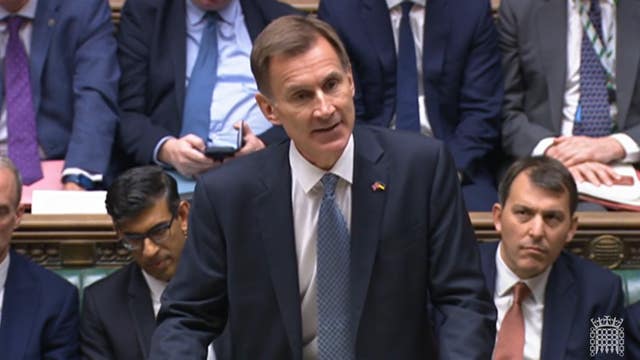Social housing rent hike cap ‘will save average tenant £200 next year’
Chancellor Jeremy Hunt told the Commons that without the cap, families living in the social rented sector would face increases of up to 11%.

The Chancellor has said he will cap the increase in social housing rents at a maximum of 7% in 2023/24, saving the average tenant £200 next year.
Jeremy Hunt told the Commons during his autumn statement on Thursday that without the cap, families living in the social rented sector could face rent hikes of up to 11%.
He said that such a hike would “clearly be unaffordable” for the four million families – almost one-fifth of households in England – who live in the social rented sector.

“Around four million families live in the social rented sector – almost one-fifth of households in England,” he told MPs.
“Their rents are set at 1% above the September inflation rate, which means that on current plans they are set to see rent hikes next year of up to 11%.
“For many, that would clearly be unaffordable, so today I can announce that this Government will cap the increase in social rents at a maximum of 7% in 2023/24.
“Compared to current plans, that is a saving for the average tenant of £200 next year.”
Previously, social landlords could increase rents in line with the Consumer Prices Index (CPI) plus one percentage point.
The CPI in September was 10.1%, which means rents could have risen as high as 11.1% without the cap.
The 7% cap was welcomed by landlords, who warned that a lower cap would have been a “potentially apocalyptic scenario” for some.
The Department for Levelling Up, Housing and Communities (DLUHC) had floated that social rent increases could be capped as low as 3%.
Samantha Grix, partner at Devonshires – who represents Registered Providers (RPs) of social housing – said: “Setting the rent cap at 7% will come as a huge relief to registered providers (RPs) and prevents a potentially apocalyptic scenario for some.
“RPs are facing a perfect storm of costs including fire safety and decarbonisation, so limiting rent increases to 3% or 5% would have been untenable for many.
“However, the higher cap will allow RPs a bit of headroom to ensure their viability and allow them to deliver the much-needed low-cost housing they provide to this country.”
However, Alex Diner, senior researcher at the New Economics Foundation, said that the 7% maximum increase will cause “huge concern” for millions of households.
“The news that social tenants could now be hit by sharply rising rents will cause huge concern and anxiety for millions of households across the country,” she said.
“More of the most vulnerable people, who are already facing skyrocketing food and energy bills, are likely now to be plunged into further financial hardship by this government’s decision.”
While Alicia Kennedy, Director of Generation Rent, called for support for private renters as well.
“As the Chancellor announced plans to cap rents in the social housing sector, and extended access to mortgage support, he left private renters vulnerable to unaffordable rent increases,” she said.
“Market rents have risen by 12% in the past year, and it is very easy for landlords to raise the rent on their current tenants when they can threaten a no-fault eviction.
“Freezing rents, suspending no-fault evictions and relinking Local Housing Allowance to actual rents would ultimately benefit the public finances by preventing homelessness, and keeping people near their jobs. Instead, private renters face a winter of hardship, particularly the one in four who are in fuel poverty.”





